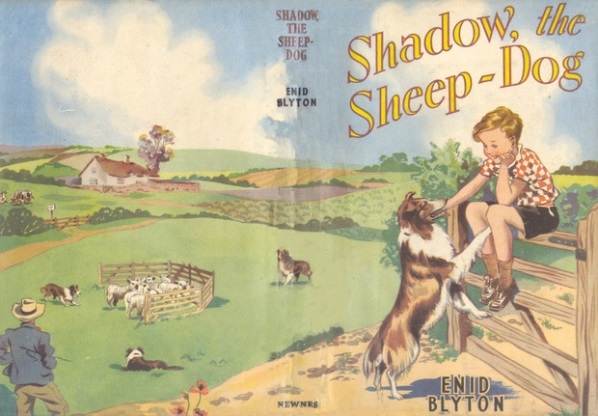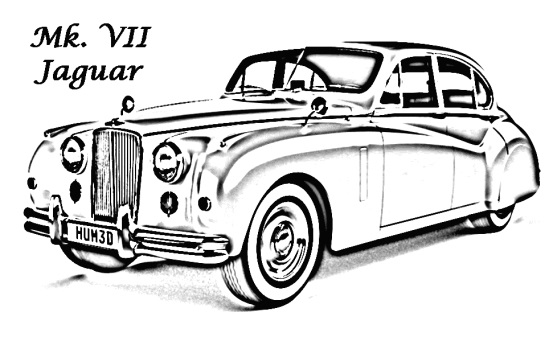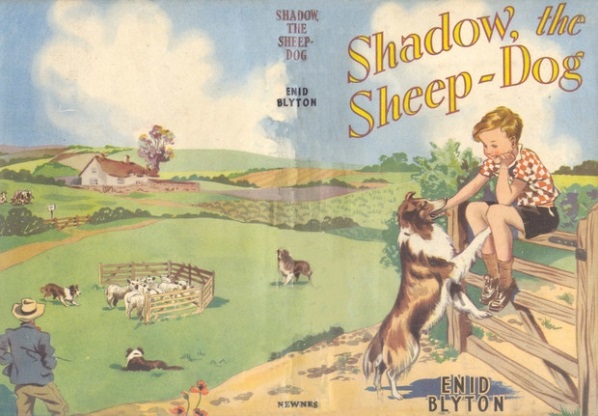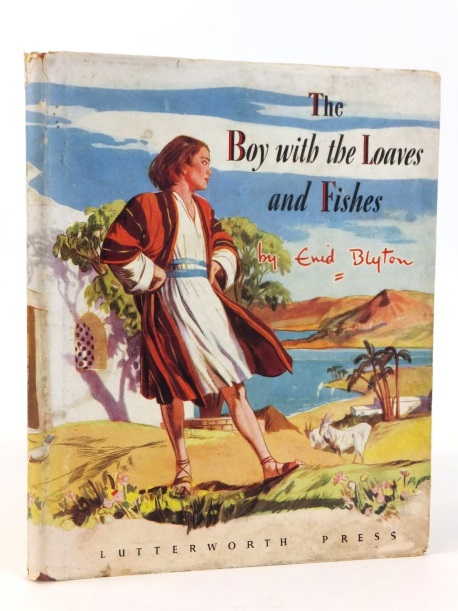When I was a boy, I didn’t read many books; but one of the books I read as a child was Shadow, the Sheepdog by Enid Blyton.
The young pup in the story is called ‘Shadow’. The author gives the puppy ‘human thoughts and reflections’. In other words, the puppy is a young boy by proxy.
This is a quick summary of what the story was about as described by the author:
“This story is about Shadow, a sheep dog, born on the farm from one of the other sheep dogs. Her name was Jessie and she had three pups. Three pups were all sold, but the third kept returning to the farm. The son of the farmer, a boy called Johnny, was allowed to keep the pup. As a condition, the pup to work for his living as did the other dogs on the farm.
Johnny called the dog Shadow, as he was constantly by his side. He trained the puppy himself, and Shadow also learnt many ways from the other dogs on the farm. There was also Jessie; she guarded the house and the yard. Tinker, Rafe, and Dandy were all sheep dogs. Bob was a mongrel, but still worked the sheep, and belonged to Andy the shepherd. “
Lessons from Shadow
As mentioned above, I read Shadow the Sheepdog when I was a boy. Ironically, I looked forward to reading Tan after my first dog book disappointed me for having ‘nasty gypsy’ episodes in it. The book was Shadow the Sheepdog by Enid Blyton.225 It was about a farmer’s boy, Johnny and his farmdog, Shadow.
Shadow was a collie, who was very fast, brave, and smart, just like our dog ‘Laddie’; although Shadow was long-haired and not a short-haired border collie like ‘Laddie’. I felt at home straight away reading the story and could easily identify with Johnny and his nice smart dog. Shadow could quickly figure out by instinct who was a good person and who was a bad person.
In the story, there were some ‘nasty’ golden eagles that are too fond of lamb’s meat and always go for new-born lambs. This upsets Johnny and his dad because they want to make lamb chops for their Sunday dinner! In the end, however, brave Shadow and Johnny finally solve the problem of the ‘evil’ golden eagle by killing it!226227
Introduction to the Gypsies
One day, some ‘nasty and dirty’ gypsies appeared in the story – camping uninvited on the farmer’s land. It was not my favourite part of the novel. I was left with an uncomfortable feeling that something was not ‘quite right’, even though Johnny saves Shadow from the ‘nasty’ gypsies.228
My mother, as mentioned above, liked to keep iconic family items in her homes. Not least, were also the books we read. So, I still have the 1958 impression of Shadow the Sheepdog. Out of curiosity, I decided to re-read the book to see if my childhood memories of the book bore some relation to reality.
The Tribe of Gypsies Passage
I will quote two or three passages here. Perhaps the first reference to gypsies in the novel (1958) is on page 138-143:
A tribe of gypsies suddenly appeared in the countryside, and asked Johnny’s father for permission to camp on a meadow near a stream. The farmer would not allow them to.
“No,” he said; “last time I let gypsies camp on my land, they stole my hens and set fire to a fence. You can’t camp on my farm.” The gypsy who came to ask permission scowled at the farmer. He was a dark brown man with black curly hair, curious gleaming eyes, and bright gold earrings in his ears. Then, he turned on his heel and went away without a word.
But that night, when Johnny went walking with Shadow through the meadows, what did he see but five or six gypsy caravans camping in the very place where his father had said they must not camp!
“Hie!” cried Johnny indignantly. “Didn’t my father say you weren’t to camp on his land?”
“Is this his land?” asked a gypsy, putting on a surprised face.
“You jolly well know it is!” cried Johnny. “You’d better get off it quickly. My father always means what he says!” The gypsy walked near to Johnny, and his face was frowning and ugly. Shadow growled.
The man stopped. “You’d better not come any nearer,” warned Johnny. “Shadow will fly at you if you do.”
The gypsy stared at the dog, and a sharp look came into his eyes. “Is that the dog everybody talks about?” he asked.
“Maybe,” said Johnny. “You’ll talk about him too, if he gets his teeth into you! He doesn’t like the look of you at all. Down, Shadow, down!” Shadow had leapt up at the man, who stepped back quickly.
“Call your dog off,” he said. “I kill any dog that goes for me!” “Shadow won’t be killed by a gypsy!” said Johnny scornfully.
“He’s too quick. Now, you’d better get your camp away from here pretty quickly, before my father comes along.” The man scowled again and went back to the camp, taking a last look at Shadow as he went. Johnny whistled to Shadow, and the two of them went home.
“Dad, the gypsies are camping on our land after all,” said Johnny that evening. “I told them to go. The gypsy I spoke to pretended that he didn’t know it was your land.”
“Well, they’ll know tomorrow all right, if they are still there!” said the farmer shortly. Next morning the camp was still there, and the farmer took Shadow and Rafe and went to speak to the gypsies. “Clear off my land before noon,” he ordered. “Do you understand me?”
“Yes,” said the same man who had spoken to Johnny the day before. “But you’ll be sorry for this!”
“Oh! So you think you’ll do some damage before you go, do you?” said the farmer at once. “I know you gypsies! Well, I’ll leave someone on guard—and anyone who tries to damage my crops, my hedges, or my fences, will be very sorry for themselves.”
He whistled to Shadow, who came bounding up. “Shadow! Guard this place! See that no gypsy harms anything belonging to me!” Shadow looked up at the farmer’s stern face and wagged his tail. He understood very well what he was to do. Of course, he could do it, too! Woe betide any gypsy who tried to injure the farmer’s property! He would have Shadow to reckon with.
The farmer went off with Rafe. Shadow sat down near the caravans. His sharp eyes took in everything. He saw the dirty children, the smelly caravans, the line of half-washed clothes, the fire on which an old gypsy woman was cooking something that smelt very good.
The gypsy-man went to the old woman and spoke to her. She nodded, and looked at Shadow. The gypsy had told her to poison a lump of meat and throw it to Shadow. Next, she slipped inside her caravan and took down a bottle. After, she went back to the fire, and took out a tasty lump of rabbit-meat with a sharp stick. She opened the lump and poured some drops from the bottle into the juicy meat. The gypsy closed the meat together and laid it on the ground for a few minutes.
Then she threw it to Shadow, expecting the dog to gobble it up. But Shadow did not move. He was not going to accept any gift from the enemies of his master! Shadow did not even turn his nose to sniff at the meat!
“It’s no good,” said the woman. “He won’t even look at it!” The gypsy-man took a quick look round. Then he picked up a stone and threw it hard at Shadow. The dog was looking at some gypsy-children and did not dodge aside as he certainly would have done if he had seen the stone coming.
It hit him hard on the side of the head. It was a big stone, and the dog rolled over at once, half stunned. Shadow felt as if he were in a dream. He could not move. His head hurt him dreadfully. Then he gave a sigh and shut his eyes. It was safe for the gypsy to go to him now, for poor Shadow could do nothing to help himself.
“Quick! Get a sack and put him into it whilst he’s like this!” said the gypsy to the old woman. One or two more gypsies came running up. Soon, the big dog was pushed into a large, strong sack. The gypsy tied up the neck with rope, and then he and another man carried poor Shadow to their caravan. They threw him inside and shut the door.
“Now we’ll clear out!” said the gypsy with the earrings. “I told the farmer he’d be sorry he told us to go—and he will! I can sell that dog for a good price!”
Critical Reading of Shadow, the Sheepdog
I had not intended to give an extensive critical reading of this novel. But you can blame it on Enid Blyton! When she spends so much time and energy depicting a racist, vindictive, hateful, Nazi-like and un-Christian portrayal of Roma people, the least I can do is spend a little time countering her sick mind!
Sometimes when you’re playing chess, your opponent makes a stupid move. Before countering the move, you should still give it a little thought even though your opponent is ‘stupid’. Don’t fall into the trap of being more stupid than your opponent!
I don’t think Enid Blyton, like my mother, was an ‘evil’ person as such. She was just a ‘stupid woman’, who through her books, mediated the prejudices of the age and culture to children. But these are just general comments. Let’s look at the above text in more detail. Of course, I can’t execute a full-blown dissection of the text, as this would almost constitute a separate book. So I will only comment on the most obvious aspects.
‘Tribes’
Blyton goes straight for the throat in calling the gypsies a ‘tribe’. Obviously, she is exploiting the negative associations of the word ‘tribe’, as connected to ‘primitiveness, viciousness, and paganism’. The British child of the 1950s could easily relate to this, as American TV cowboy series portrayed Indian tribes as evil, violent, unchristian, and inhuman – in the same way as the Nazis portrayed Jews as vermin that had to be exterminated.
Moreover, British children were fed with racist stories of primitive African tribes in various comics and books. Apart from this, the use of the word ‘tribe’ is historically incorrect. The Romani (‘gypsies’) are an Indo-Aryan ethnic group, traditionally nomadic itinerants (not a ‘tribe’).229 Ha ha:-) I will never get to the end of this if I spend half a page describing one word! So, I will endeavour to keep my following comments to a minimum.
“The farmer would not allow them to. “No,” he said; “last time I let gypsies camp on my land, they stole my hens and set fire to a fence. You can’t camp on my farm.”
Well, the meaning here is fairly obvious. The gypsies are thieves and destructive.
“The gypsy who came to ask permission scowled at the farmer. He was a dark brown man with black curly hair, curious gleaming eyes, and bright gold earrings in his ears.”
This is almost comical – it is obviously a stereotypical description. There are almost erotic undertones here. One tends to think here of D. H. Lawrence’s novel, The Virgin and the Gypsy. Western culture tends to eroticize gypsy people, such as in the paintings of Bolesław Jan Czedekowski the celebrated Polish artist.230
“Hie!” cried Johnny indignantly. “Didn’t my father say you weren’t to camp on his land?”
A conflict arises because the gypsies camp on the farmer’s land. In other words, the gypsies are also portrayed as ‘liars’ and defiant (because they were told not to camp by the farmer).
“Is this his land?” asked a gypsy, putting on a surprised face.
Thus, a conflict arises. The gypsy implicitly threatens to steal the dog, and Johnny says he will tell his dog to attack them. Shadow is set to guard the gypsy camp, but they stun the dog with a stone, and tie him in a sack – they plan to sell him.
Of course, the irony here is that the farmer sells his sheep, lambs, and pigs at the market to be slaughtered (although the word ‘slaughter’ is not used in the novel). The farmer and his son Johnny are portrayed as ‘friends and protectors of the animals’. When Johnny takes the lambs to the market, it is described almost as if the lambs are ‘going on holiday’; it doesn’t show the reality of being sent totheir execution and slaughter to provide lamb-chop Sunday dinners in British homes.
The gypsies just want to sell one dog (not slaughter it), unlike the farmer who slaughters hundreds of animals every year (in modern parlance this is an example of ‘fake news’ or ‘spin’). Ironically, Shadow is given human characteristics and also has a critical eye towards the gypsies and their ‘dirty children’:
The farmer went off with Rafe. Shadow sat down near the caravans. His (Shadow’s) sharp eyes took in everything. He saw the dirty children, the smelly caravans, the line of half-washed clothes, the fire on which an old gypsy woman was cooking something that smelt very good.
Blyton says this only good thing about the gypsies, that is: “an old gypsy woman was cooking something that smelt very good”. But this is just a ploy to prepare the reader for the fact that the gypsies intend to poison Shadow:
The gypsy had told her to poison a lump of meat and throw it to Shadow. She slipped inside her caravan and took down a bottle. The gypsy went back to the fire, and took out a tasty lump of rabbit-meat with a sharp stick. Next, she opened the lump and poured some drops from the bottle into the juicy meat. She closed the meat together and laid it on the ground for a few minutes.
Then she threw it to Shadow, expecting the dog to gobble it up. But Shadow did not move. He was not going to accept any gift from the enemies of his master! He did not even turn his nose to sniff at the meat!
In the end the gypsies decided to stun Shadow by throwing a stone at him: It hit him hard on the side of the head. It was a big stone, and the dog rolled over at once, half stunned.
They then proceeded to put Shadow into a sack: “Quick! Get a sack and put him into it whilst he’s like this!” said the gypsy to the old woman.
Personal Perception of the Gypsies
I already had a certain ‘perception’ of ‘gypsies’ due to my mother. They used to come to our village two or three times a year with their fun fair that all the kids loved. However, my mother had already warned me not to go there alone and talk to them. To her, they were ‘dirty and thieving’. Reading the book, I had thought that perhaps my mother was right about them.
In retrospect, this is quite ironic given the rumour that our family on the Isle of Eigg in Scotland, where my grandmother was born, was said to be descended from Irish gypsies. They were thought to have been exiled from Ireland after being accused or convicted of murder. I heard this story from a cousin of mine Kathleen (Katie McKinnon’s granddaughter) who lives on Eigg (in 2006).
I even tried to track down the main source of this story, an older member of my wider family, by travelling to the Isle of Lewis where he was said to be living. Unfortunately, I was poorly prepared and never managed to locate him. This was 15 years ago (as of 2022), so he is most likely deceased now – so this is another ‘story’ lost in the mists of time.
225 Enid Blyton is one of the most popular of British writers for children, selling more than 600 million copies. She is best remembered today for her books, Noddy, Famous Five, Secret Seven, The Five Find-Outers and Malory Towers.
226 Johnny and Shadow do not need to kill more ‘nasty’ golden eagles, as this rare and protected species now seems to be extinct in England. But there seems to be some confusion here, as the golden eagle disappeared from England and Wales in the 19th century due to severe persecution. https://www.wildlifetrusts.org/wildlife-explorer/birds/birds-prey/golden-eagle Read: 16 March 2022.
227 “Shadow gets up to all sorts of adventures and incurs the jealousy of his fellow working dogs but continues to save Johnny from nasty gypsies and his bravery culminates in saving newborn lambs from vicious Golden Eagles which he kills thereby making this magnificent species extinct in England, incurring a £5,000 fine from the RSPB and being put down.” https://www.goodreads.com/en/book/show/1442955.Shadow_the_Sheepdog Read: 6 May 2020.
228 She wrote Shadow the Sheepdog with its cynical and racist stereotyping of the ‘nasty and unwanted’ gypsies (Romani people) in 1942. One may cynically say that the main problem for Johnny and Shadow concerning the gypsies (Romani people) is that they are living in England and not Germany. When the book was published in 1942, Hitler and his Nazis had found the ‘final solution’ for getting rid of ‘nasty and unwanted people’ – and that was simply to exterminate them.
Under Adolf Hitler, and the Nuremberg Laws, the Romani were classified as “enemies of the race-based state”. As many as 500,000 Romani were killed by the Germans and their collaborators. If the Nazis had been successful in invading England they would have solved Johnny’s problem with the gypsies for good by implementing the ‘final solution’.
229 https://en.wikipedia.org/wiki/Romani_people Read: 7 May 2022.
230 https://en.wikipedia.org/wiki/Boles%C5%82aw_Jan_Czedekowski




2 Replies to “The Gypsies and Shadow, the Sheepdog”